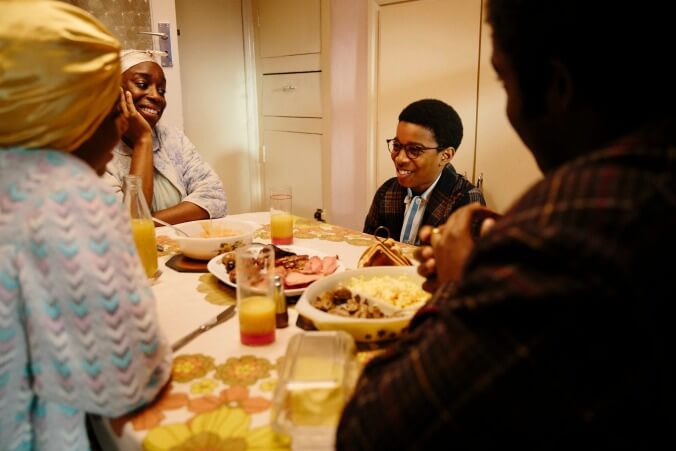Steve McQueen’s Education presents a moving history lesson on racial bias

School can be a dangerous place for Black youth. If the teachers are primarily white, there’s a good chance they don’t know how to interact with and properly support the education of Black children. A large part of racism is based on a combination of fear and a natural inclination toward condescension. If a white teacher looks down on their Black students, they can feel it, whether it’s explicitly expressed or not. That, coupled with the white-centric nature of education in the Western world, reveals the deep biases in learning environments. When one considers how much white educators control the content of textbooks, standardized tests, and the overall tone of the educational environment, it’s easy to understand why so many Black students have difficulty in school. Why learn in an environment pre-determined to reject you? How can you come to a teacher for help if they don’t want to be around you?
Children are very intuitive. They can tell when they aren’t wanted. And once that is established, there’s no reason to try anymore. School becomes a place where enthusiasm and curiosity go to die. These are the themes explored in Education, a film within Steve McQueen’s Small Axe anthology. Like the other entries in the series—Mangrove, Lovers Rock, Red, White And Blue, and Alex Wheatle—Education tells a story within the British Caribbean communities in London in the 1970s. But unlike the other installments, Education focuses on children and the way that London’s racist policies affect their learning opportunities and, by extension, their self-worth. The film centers on Kingsley Smith (Kenyah Sandy), a primary school boy struggling with reading. His mom (Sharlene Whyte) and dad (Daniel Francis) have their hands full with work, and his older sister (Tamara Lawrance) has her eyes on her own dreams.
In school, Kingsley is constantly berated by his white teachers. In one scene where he has trouble reading, his teacher insults him instead of encouraging the other children to help him out. Later, Kingsley lashes out in music class, expelling his frustration from earlier. When he returns home, he doesn’t mention his struggles. McQueen is deft at illustrating the dynamics of immigrant families—everyone is working intensely to make the most of their lives in a country that sees them as alien. There’s unspoken encouragement to keep one’s head down, to avoid standing out. Although Kingsley struggles with reading, he wrestles even more with the worry of being a burden to the people around him.
This way of life is disrupted when Kingsley is singled out to transfer to a “special school” due to his supposed failure of an IQ test. He soon realizes that the school isn’t special at all—it’s the London educational system’s (and, more specifically, the Haringey borough’s) way of giving up on students it doesn’t value. Teachers rarely come to class and when they do, they don’t bother to give the children full lessons. Most of the time the students are left to run wild while none of their learning difficulties are addressed. Sandy does an incredible job of portraying the deep sadness and isolation of Kingsley, a boy who identifies more with constellations than the people around him. He has dreams of being an astronaut, a career he’s worried isn’t possible for him due to his awful treatment in school.
Thankfully, two activists (Josette Simon and Naomi Ackie) come into Kingsley’s life, advocating for his education and revealing the racial bias at play in his situation. Their arrival pushes Kingsley’s mother to get out of her comfort zone and openly advocate for her son’s education. The film is as much about her as it is Kingsley, and Whyte gives an excellent performance as a strong, guarded, fiercely independent woman trying to do right by her son.
As with most of the other Small Axe films, Education is based on real life, in this case obstacles that Caribbean students faced in the ’70s. But even in 2020, not much has changed in the U.K.—studies and reports reveal racial bias continues to this day. Black and Caribbean children are targeted for their hair, cultural expression, different patterns of speech, and countless other personal attributes that don’t actually have a real bearing on their educational development. “Educators perceive Black children as fundamentally disruptive, hopeless, and inferior, regardless of what they do,” journalist Kuba Shand-Baptiste wrote earlier this year. This mirrors Kingsley’s struggle perfectly—he’s a kind, bright boy too often treated like he is a troublemaker. The special school he attends targets Black children with the hope that they give up on pursuing education altogether. Unfortunately, Education doesn’t delve much into the fraught nature of “special education” and the way that school systems refuse to accommodate those with physical and learning disabilities. This might be due to the film’s short length and specific subject matter. Kingsley’s story does feel complete by the end, but there is a sense that the film could have benefited from Mangrove’s length and scope.
Still, there is no denying the thoughtful, emotional power of Education. It’s a film that goes right for the heart, revealing how a caring community comes together and creates its own space to thrive. Education is a story about the work Caribbean immigrants have always done to preserve their culture and take care of each other. Sometimes it really does take a village.